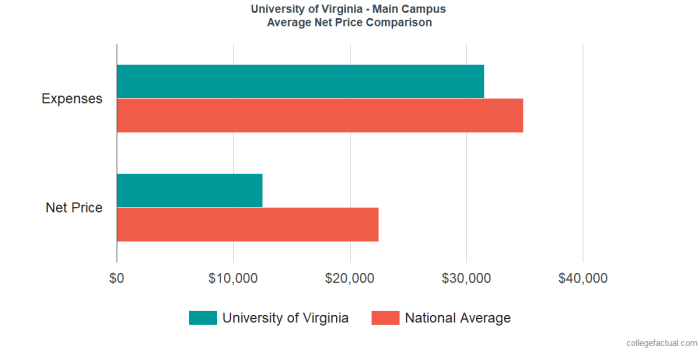In the realm of higher education, the University of Virginia stands as a beacon of academic excellence. As students embark on their educational journeys, understanding the financial implications is paramount. This comprehensive guide delves into the intricacies of the University of Virginia’s pricing structure, empowering prospective students with the knowledge to make informed decisions about their financial futures.
From tuition and fees to living expenses, this guide provides a transparent overview of the costs associated with pursuing a degree at this esteemed institution. With insights into financial aid opportunities, housing options, and meal plans, students can navigate the financial landscape with confidence, ensuring their academic pursuits are not hindered by financial constraints.
Tuition and Fees
The University of Virginia offers competitive tuition rates and fee structures for undergraduate, graduate, and international students. Tuition costs vary depending on the student’s program of study, residency status, and year of enrollment.
Undergraduate Tuition
For the 2023-2024 academic year, undergraduate tuition for in-state students is $18,036, while out-of-state students pay $52,272. Tuition for international students is set at $60,320.
Graduate Tuition
Graduate tuition rates vary by program and degree level. For the 2023-2024 academic year, the average tuition for a master’s degree is $30,000 for in-state students, $45,000 for out-of-state students, and $55,000 for international students. The average tuition for a doctoral degree is $32,000 for in-state students, $47,000 for out-of-state students, and $57,000 for international students.
Additional Costs
In addition to tuition, students may incur additional costs such as fees for housing, dining, health insurance, and transportation. The estimated cost of attendance for the 2023-2024 academic year is $33,336 for in-state undergraduates, $61,572 for out-of-state undergraduates, and $75,820 for international undergraduates. For graduate students, the estimated cost of attendance is $42,000 for in-state students, $57,000 for out-of-state students, and $72,000 for international students.
Financial Aid and Scholarships
The University of Virginia offers a comprehensive financial aid program to assist students in meeting the costs of their education. Financial aid is available in the form of grants, scholarships, loans, and work-study programs.
Grants
Grants are gift aid that does not have to be repaid. They are awarded based on financial need and academic merit. The most common types of grants are the Pell Grant and the Virginia Tuition Assistance Grant (VTAG).
Scholarships
Scholarships are also gift aid, but they are typically awarded based on academic merit, athletic ability, or other special talents. There are many different types of scholarships available, and the application process varies depending on the scholarship.
Loans
Loans are a type of financial aid that must be repaid. They are available to both undergraduate and graduate students. The most common types of loans are the Federal Direct Stafford Loan and the Federal Direct PLUS Loan.
Work-Study Programs
Work-study programs allow students to earn money to help pay for their education. Students who participate in work-study programs are employed by the university or by off-campus employers.
Cost of Living

The cost of living for students at the University of Virginia varies depending on factors such as housing, food, transportation, and entertainment. On-campus housing options range from $8,000 to $12,000 per year, while off-campus housing can cost between $600 and $1,200 per month. Groceries typically cost around $300-$400 per month, and transportation expenses can vary depending on whether students have a car or rely on public transportation. Entertainment costs can also vary widely depending on individual preferences.
Housing
The University of Virginia offers a variety of on-campus housing options, including traditional dorms, apartments, and suites. The cost of on-campus housing varies depending on the type of room and the meal plan selected. Off-campus housing options are also available, and students can choose from a variety of apartments, houses, and townhouses. The cost of off-campus housing can vary depending on the location and the size of the unit.
Food
There are a variety of dining options available to students at the University of Virginia. The university offers a variety of meal plans, which can be used at dining halls, cafes, and restaurants on campus. Students can also cook their own meals in their dorm rooms or apartments. The cost of food will vary depending on the type of meal plan selected and the student’s eating habits.
Transportation
The University of Virginia is located in a walkable area, and many students choose to get around by foot or by bike. The university also offers a free bus system that connects the various parts of campus. Students who have cars can purchase a parking permit, which costs $250 per year. The cost of transportation will vary depending on the student’s transportation choices.
Entertainment
There are a variety of entertainment options available to students at the University of Virginia. The university offers a variety of student organizations, clubs, and activities. Students can also attend sporting events, concerts, and other events on campus. The cost of entertainment will vary depending on the student’s interests and budget.
Housing Options

The University of Virginia offers a variety of housing options for students, both on and off campus. On-campus housing includes traditional dormitories, suites, and apartments. Off-campus housing options include apartments, houses, and Greek life housing.
The cost of on-campus housing varies depending on the type of room and the meal plan selected. The cost of off-campus housing varies depending on the location, size, and amenities of the unit.
On-Campus Housing
- Traditional dormitories are the most affordable on-campus housing option. They typically have shared bedrooms and bathrooms.
- Suites are more expensive than traditional dormitories, but they offer more privacy. They typically have private bedrooms and bathrooms.
- Apartments are the most expensive on-campus housing option. They offer the most privacy and space.
Off-Campus Housing
Off-campus housing is generally more expensive than on-campus housing, but it offers more flexibility and privacy. Students can choose to live in apartments, houses, or Greek life housing.
- Apartments are the most popular type of off-campus housing. They offer a variety of sizes and amenities.
- Houses are a good option for students who want more space and privacy. They are typically more expensive than apartments.
- Greek life housing is an option for students who are members of a fraternity or sorority. It offers a sense of community and support.
Choosing the Right Housing Option
The best housing option for a student depends on their individual needs and budget. Students should consider the following factors when choosing a housing option:
- Cost
- Privacy
- Space
- Amenities
- Location
Meal Plans

The University of Virginia offers a variety of meal plans to accommodate the diverse needs of its students. These plans range in flexibility and cost, allowing students to choose the option that best fits their lifestyle and budget.
Meal plans provide a convenient and cost-effective way to dine on campus. By purchasing a meal plan, students can avoid the hassle of cooking and cleaning, and they can enjoy a variety of dining options at a discounted rate.
Meal Plan Options
- Unlimited Meal Plan: This plan provides students with unlimited access to all dining halls on campus. It is the most expensive meal plan option, but it offers the greatest flexibility.
- Block Meal Plan: This plan allows students to purchase a set number of meals per week. It is a more affordable option than the Unlimited Meal Plan, but it offers less flexibility.
- Flex Meal Plan: This plan combines the flexibility of the Unlimited Meal Plan with the affordability of the Block Meal Plan. Students can purchase a set number of meals per week, plus a certain amount of flex dollars that can be used at any dining location on campus.
The cost of meal plans varies depending on the type of plan and the number of meals purchased. Students can find more information about meal plans and pricing on the University of Virginia Dining Services website.
Clarifying Questions
What is the tuition for undergraduate students at the University of Virginia?
For the 2023-2024 academic year, the tuition for undergraduate students at the University of Virginia is $15,884 for Virginia residents and $47,850 for non-Virginia residents.
What types of financial aid are available to students at the University of Virginia?
The University of Virginia offers a range of financial aid options to students, including grants, scholarships, loans, and work-study programs. The university meets 100% of demonstrated financial need for all admitted students.
What is the average cost of housing for students at the University of Virginia?
The average cost of housing for students at the University of Virginia is $10,000 per year. The university offers a variety of on-campus and off-campus housing options to meet the needs of its students.




